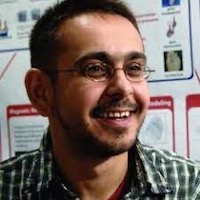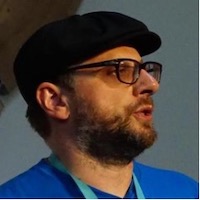IEEE Services 2022 Plenary Panel:
Discovery Technology Foundations and Open Science
Plenary Panel: Discovery Technology Foundations and Open Science
Date/Time: Tuesday July 12
15:40-17:00 CET (Barcelona)
The ability to make rapid progress in science is more urgent than ever, as demanded by the tremendous societal challenges we are facing, from ensuring our health broadly to climate change to food shortages to energy to security. Scientific discovery – built on the scientific method, is our best tool to advance our knowledge and capabilities for solving to these challenges. At the same time, powered by technology advances in Artificial Intelligence, High Performance Computing, and Hybrid Cloud … with even further impact expected from Quantum Computing, we are entering a new era of Accelerated Discovery. New computational methods built on growing volumes of data are helping significantly to break through bottlenecks and speed up key steps in discovery, and enable new levels of automation and autonomy. This pace and scale is being further amplified through collaborative efforts that create and build on open data, open source, and open challenges. This panel will explore both the evolving landscape of discovery technologies and opportunities for further advancing open science.
Panel Chair:
 John R. Smith is an IBM Fellow at IBM Research, where he leads Discovery Technology Foundations as part of IBM’s initiative on Accelerated Discovery. Dr. Smith received his B.S., M.S., M. Phil, and Ph.D. in Electrical Engineering from Columbia University. He has authored several hundreds of articles at top conferences and journals in AI, multimedia, information retrieval, and database systems and is an inventor of over 100 United States patents. In October 2020, he was awarded the ACM SIGMM Technical Achievement Award. Dr. Smith is a Fellow of IEEE. https://researcher.watson.ibm.com/researcher/view.php?person=us-jsmith
John R. Smith is an IBM Fellow at IBM Research, where he leads Discovery Technology Foundations as part of IBM’s initiative on Accelerated Discovery. Dr. Smith received his B.S., M.S., M. Phil, and Ph.D. in Electrical Engineering from Columbia University. He has authored several hundreds of articles at top conferences and journals in AI, multimedia, information retrieval, and database systems and is an inventor of over 100 United States patents. In October 2020, he was awarded the ACM SIGMM Technical Achievement Award. Dr. Smith is a Fellow of IEEE. https://researcher.watson.ibm.com/researcher/view.php?person=us-jsmith
Panelists:
 Ahment Erdemir is Director at Computational Biomodeling (CoBi) Core and Erdemir Laboratory, Lerner Research Institute, Cleveland Clinic. His primary scientific and clinical contributions are in simulation-based medicine, primarily in biomechanics, which explores motion and deformation of biological structures as they interact with the environment. His technical niche has been in physics-based computational modeling and simulation. https://www.lerner.ccf.org/bme/erdemir/
Ahment Erdemir is Director at Computational Biomodeling (CoBi) Core and Erdemir Laboratory, Lerner Research Institute, Cleveland Clinic. His primary scientific and clinical contributions are in simulation-based medicine, primarily in biomechanics, which explores motion and deformation of biological structures as they interact with the environment. His technical niche has been in physics-based computational modeling and simulation. https://www.lerner.ccf.org/bme/erdemir/
 Alexy Khrabrov is the founder and organizer of Scale By the Bay and several Bay Area meetups, including SF Scala, SF Spark, and Bay Area AI. He is currently a Open Source Science Community Director, IBM Accelerated Discovery. Previously Alexy was a General Manager of the Reactive Foundation (a project of the Linux Foundation), a Chief Community Officer of the Trusted IoT Alliance, a Chief Scientist at Nitro, a software engineer at various internet companies before that, including Amazon, and a researcher at Dartmouth, UPenn, and NEC Research Institute. Alexy holds a Ph.D. in Computer Science from the University of Pennsylvania.
Alexy Khrabrov is the founder and organizer of Scale By the Bay and several Bay Area meetups, including SF Scala, SF Spark, and Bay Area AI. He is currently a Open Source Science Community Director, IBM Accelerated Discovery. Previously Alexy was a General Manager of the Reactive Foundation (a project of the Linux Foundation), a Chief Community Officer of the Trusted IoT Alliance, a Chief Scientist at Nitro, a software engineer at various internet companies before that, including Amazon, and a researcher at Dartmouth, UPenn, and NEC Research Institute. Alexy holds a Ph.D. in Computer Science from the University of Pennsylvania.
 Ernesto Damiani Ernesto Damiani (Senior Member, IEEE) is currently a Full Professor with the Università degli Studi di Milano, Italy, the Senior Director of the Robotics and Intelligent Systems Institute, and the Director of the Center for Cyber Physical Systems (C2PS), Khalifa University, United Arab Emirates. He is also the Leader of the Big Data Area, Etisalat British Telecom Innovation Center (EBTIC) and the President of the Consortium of Italian Computer Science Universities (CINI). He is also part of the ENISA Ad-Hoc Working Group on Artificial Intelligence Cybersecurity. He has pioneered model-driven data analytics. He has authored more than 650 Scopus-indexed publications and several patents. His research interests include cyber-physical systems, big data analytics, edge/cloud security and performance, artificial intelligence, and machine learning. He was a recipient of the Research and Innovation Award from the IEEE Technical Committee on Homeland Security, the Stephen Yau Award from the Service Society, the Outstanding Contributions Award from IFIP TC2, the Chester-Sall Award from IEEE IES, the IEEE TCHS Research and Innovation Award, and a Doctorate Honoris Causa from INSA-Lyon, France, for his contribution to big data teaching and research.
Ernesto Damiani Ernesto Damiani (Senior Member, IEEE) is currently a Full Professor with the Università degli Studi di Milano, Italy, the Senior Director of the Robotics and Intelligent Systems Institute, and the Director of the Center for Cyber Physical Systems (C2PS), Khalifa University, United Arab Emirates. He is also the Leader of the Big Data Area, Etisalat British Telecom Innovation Center (EBTIC) and the President of the Consortium of Italian Computer Science Universities (CINI). He is also part of the ENISA Ad-Hoc Working Group on Artificial Intelligence Cybersecurity. He has pioneered model-driven data analytics. He has authored more than 650 Scopus-indexed publications and several patents. His research interests include cyber-physical systems, big data analytics, edge/cloud security and performance, artificial intelligence, and machine learning. He was a recipient of the Research and Innovation Award from the IEEE Technical Committee on Homeland Security, the Stephen Yau Award from the Service Society, the Outstanding Contributions Award from IFIP TC2, the Chester-Sall Award from IEEE IES, the IEEE TCHS Research and Innovation Award, and a Doctorate Honoris Causa from INSA-Lyon, France, for his contribution to big data teaching and research.